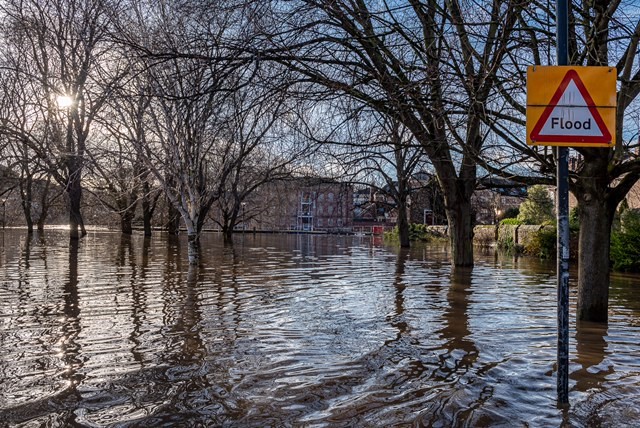14 October 2021

People who live and work in Yorkshire are being asked about how much they know about making their property flood resilient as part of a national project.
Yorkshire Flood Resilience is one of three Pathfinder Projects in the country that have been funded by the Department for the Environment, Food and Rural Affairs (Defra) and it’s now being evaluated.
The project has been led by City of York Council, in partnership with JBA Consulting and many other organisations, since December 2019. It aimed to increase the understanding and uptake of property flood resilience measures, which is a term used to describe measures that reduce the risk of flood damage to properties, speed up recovery and enable people to move back into properties more quickly after flooding.
A survey is now being carried out by Yorkshire Integrated Catchment Solutions Programme (iCASP) to determine whether the project has been a success and find out views from a wide range of people on property flood resilience (PFR).
Findings will be shared with the government, local authorities across the country and a host of other partners to help shape future work aimed at encouraging people to install flood resilience measures at their property.
The survey, available at Yorkshire Flood Resilience Survey (onlinesurveys.ac.uk), is aimed not only at residents and business owners, but also flood groups, landlords and community groups; property, trade and building suppliers including developers and maintenance contractors; financial advisers, insurance companies, investors and mortgage lenders and Flood Risk Management Authorities including the Environment Agency, water companies and local authorities.
Shelley Evans and Dr Ben Rabb, iCASP Impact Translation Fellows are using the study to monitor and evaluate the impact of change in peoples’ perception, attitude and behaviour towards property flood resilience measures.
Shelley, who is also a Principal Flood Emergency Planner and leads the northern flood resilience team for JBA Consulting, said: “Yorkshire has one of the highest levels of flood risk in the UK from all sources of flooding and it is essential people take action to increase the resilience of their homes and businesses, particularly in areas where traditional flood defences are not viable.
“This survey will help us understand if the project has made a difference and how. We want to capture the opinions of a wide variety of people and organisations.”
Dr Ben Rabb added: “Flood events will become more frequent in the future as a result of climate change and many home and business owners don’t realise that there are steps they can take themselves to make their property more resilient to flooding.
“Throughout this project a wealth of information, tools and resources have been created aimed at everyone from home and business owners to private landlords to help people understand what property flood resilience is, how it works and what the benefits are.”
Yorkshire Flood Resilience Project Manager Steve Wragg, who is also Flood Risk Manager at City of York Council, said: “Communities across Yorkshire face a variety of different flood risks. We want people to be aware that it is possible to protect yourself, your home and your business against the stress, worry, disruption and cost of flooding.
“Property flood resilience solutions are bespoke to each property and there are plenty of expert providers out there who will work with property owners to identify the most appropriate measures for the type of flooding they face.”
The bespoke measures are installed in homes or businesses to make them less vulnerable to flooding. Some work by preventing, delaying or limiting the amount of water entering your property to give you more time to move your belongings above ground level and move your family and pets to safety.
Other examples include materials, products and construction techniques to adapt the inside of your property to minimise the damage caused if floodwater does enter, an approach that reduces the likelihood of permanent damage to your home or business, and speeds up recovery after a flood.
Among the valuable resources and tools created during the project, and now leaving a legacy for future use, are a website www.yorkshirefloodresilience.co.uk where people can access a wealth of information and advice, a fun and educational game for children, downloadable information packs, a series of online training modules and animations explaining what property flood resilience is in simple terms.
The project also provided funding towards the cost of developing the Living With Water Community Hub, at Wilberforce College in Hull – a regional centre where people can learn more about PFR and view demonstration models.
For further details, contact Cath Seal communications officer for iCASP email: C.Seal@leeds.ac.uk or tel: 07862 254281.
Ends
Notes for editors
- The Yorkshire Integrated Catchment Solutions Programme (iCASP) is a six-year programme based at University of Leeds funded by the Natural Environment Research Council. iCASP projects focus on using existing environmental science more effectively to address challenges in rural and urban areas. These include: reducing flood and drought risk; improving the resilience to climate change; supporting sustainable agriculture; preserving valuable areas of peat in the moors and devising business cases for greening city developments. For more information visit www.icasp.org.uk
- For more about Yorkshire Flood Resilience visit https://yorkshirefloodresilience.co.uk/ and https://icasp.org.uk/projects-2-2/yorkshire-property-flood-resilience-pathfinder/
